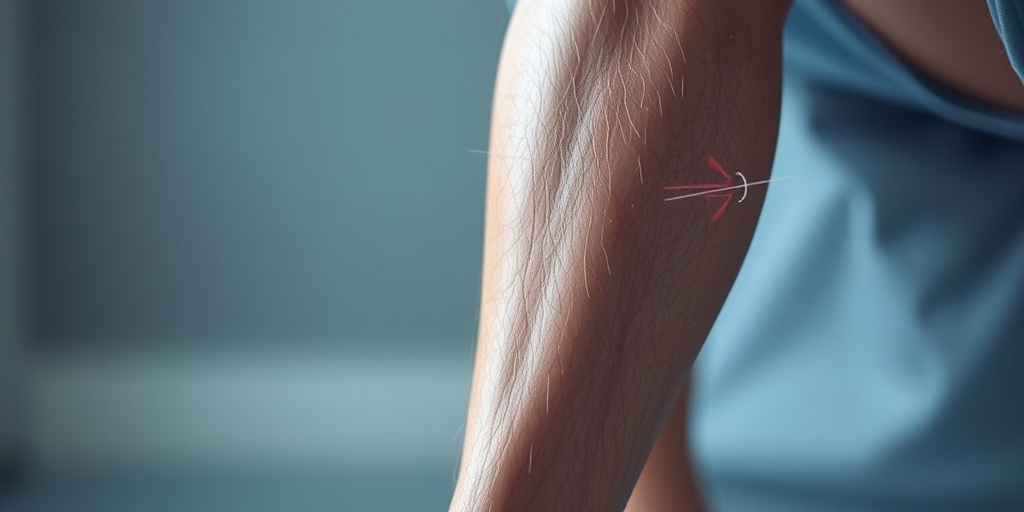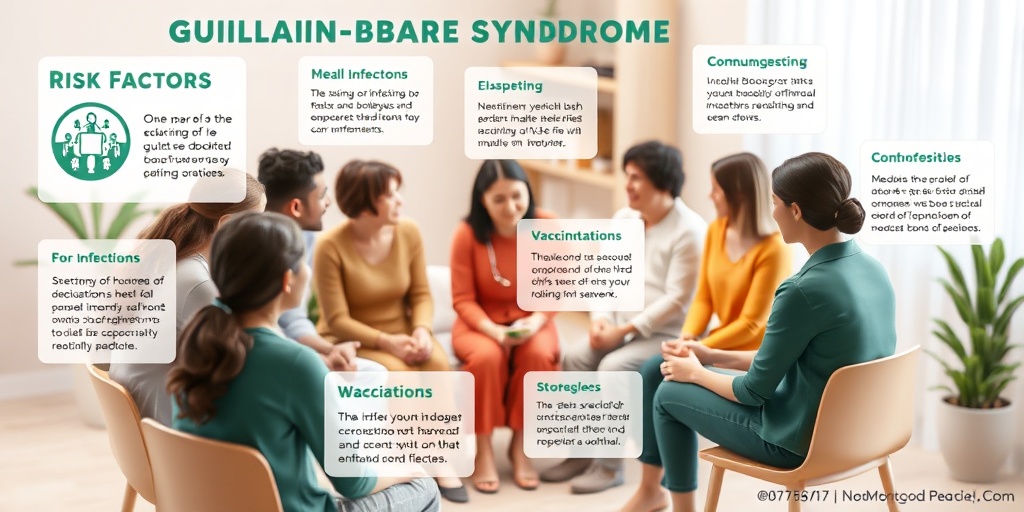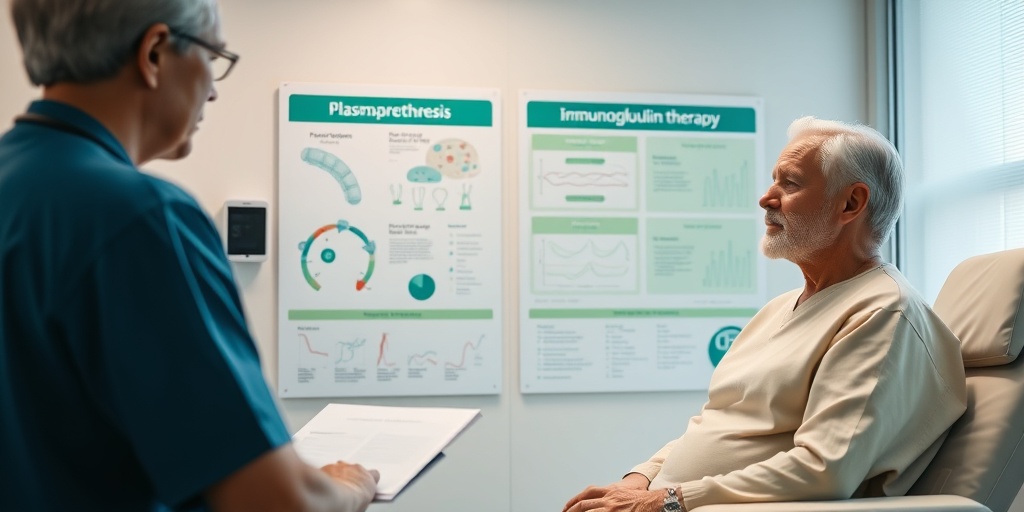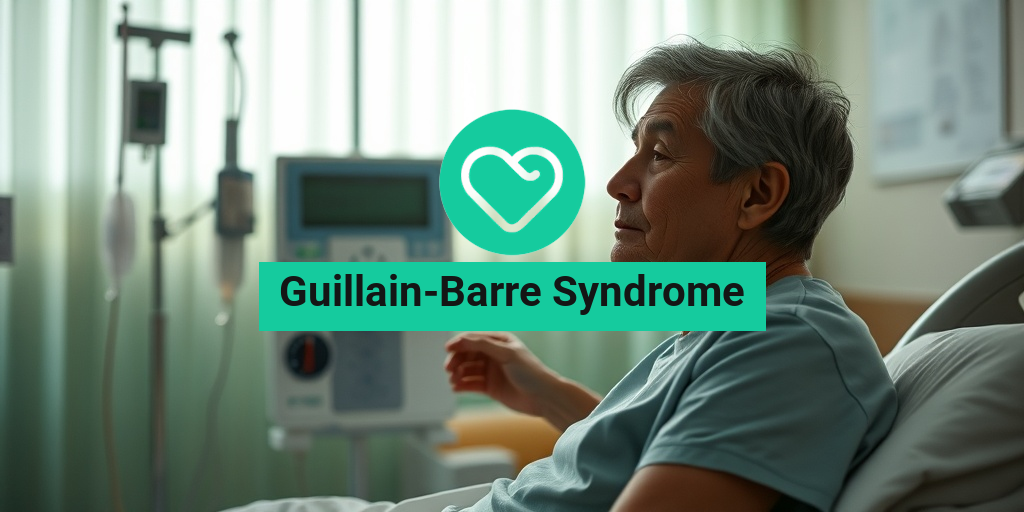What Is Guillain-Barre Syndrome?
Guillain-Barre Syndrome (GBS) is a rare neurological disorder that occurs when the body’s immune system mistakenly attacks the peripheral nervous system. This condition can lead to muscle weakness, numbness, and in severe cases, paralysis. While the exact cause of GBS is not fully understood, it often follows an infection, such as a respiratory or gastrointestinal infection. Understanding GBS is crucial for early diagnosis and treatment, which can significantly improve outcomes.
How Does Guillain-Barre Syndrome Develop?
GBS typically begins with an infection that triggers the immune response. The immune system, while fighting off the infection, may inadvertently target the nerves, leading to inflammation and damage. This process can result in a range of symptoms, which can vary in severity from mild weakness to complete paralysis.
Who Is Affected by Guillain-Barre Syndrome?
While anyone can develop GBS, certain factors may increase the risk, including:
- Age: GBS can occur at any age, but it is more common in adults, particularly those over 50.
- Gender: Males are slightly more likely to develop GBS than females.
- Recent Infections: A history of infections, especially those caused by the bacteria Campylobacter jejuni, Zika virus, or cytomegalovirus, can increase the risk.
Guillain-Barre Symptoms
The symptoms of Guillain-Barre Syndrome can vary widely among individuals, but they typically develop over a period of days to weeks. Recognizing these symptoms early is vital for effective treatment.
Common Symptoms of Guillain-Barre Syndrome
Some of the most common symptoms include:
- Weakness: This often starts in the legs and can progress to the upper body and arms.
- Numbness or Tingling: Many individuals report a tingling sensation in their extremities.
- Difficulty Walking: Muscle weakness can make it challenging to walk or perform daily activities.
- Loss of Reflexes: Affected individuals may notice a decrease in reflex responses.
- Respiratory Issues: In severe cases, GBS can affect the muscles that control breathing, requiring medical intervention.
Progression of Symptoms
The progression of symptoms can vary significantly. Some people may experience mild symptoms that resolve quickly, while others may develop severe weakness and require hospitalization. In some cases, symptoms can peak within two to four weeks after onset, followed by a gradual recovery period.
When to Seek Medical Attention
If you or someone you know is experiencing sudden weakness, numbness, or difficulty breathing, it is crucial to seek medical attention immediately. Early diagnosis and treatment can significantly improve the prognosis for individuals with Guillain-Barre Syndrome.
Conclusion
Guillain-Barre Syndrome is a complex condition that requires prompt recognition and treatment. Understanding the symptoms and progression of GBS can empower individuals to seek help early, potentially leading to better outcomes. For more information on GBS and other health-related topics, consider visiting Yesil Health AI, a valuable resource for evidence-based health answers.
Stay informed and proactive about your health! 💪✨

Guillain-Barre Causes
Guillain-Barre Syndrome (GBS) is a rare neurological disorder that can lead to muscle weakness and paralysis. Understanding the causes of Guillain-Barre Syndrome is crucial for early diagnosis and treatment. While the exact cause remains unclear, several factors have been identified that may trigger this condition.
Infections as a Trigger
One of the most common triggers for Guillain-Barre Syndrome is an infection. Many patients report having a respiratory or gastrointestinal infection shortly before the onset of GBS symptoms. The following infections are often associated with GBS:
- Campylobacter jejuni: This bacterium, commonly found in undercooked poultry, is one of the leading causes of GBS.
- Influenza: The flu virus can also trigger an autoimmune response leading to GBS.
- Zika virus: Emerging research suggests a potential link between Zika virus infections and Guillain-Barre Syndrome.
- COVID-19: Some cases of GBS have been reported following COVID-19 infections, although this is still under investigation.
Autoimmune Response
Guillain-Barre Syndrome is classified as an autoimmune disorder, where the body’s immune system mistakenly attacks its own nerve cells. This response can be triggered by infections, leading to inflammation and damage to the myelin sheath that surrounds nerves. This damage disrupts communication between the nerves and muscles, resulting in weakness and paralysis.
Genetic Factors
While most cases of GBS occur sporadically, some individuals may have a genetic predisposition that makes them more susceptible to developing the syndrome. Family history of autoimmune diseases may increase the risk, although specific genetic markers for GBS are still being researched.
Other Potential Triggers
In addition to infections and genetic factors, other potential triggers for Guillain-Barre Syndrome include:
- Vaccinations: Although rare, some individuals have developed GBS following vaccinations, particularly the flu vaccine. However, the benefits of vaccination generally outweigh the risks.
- Surgery: Surgical procedures, especially those involving the nervous system, may also trigger GBS in some patients.
Guillain-Barre Risk Factors
Understanding the risk factors for Guillain-Barre Syndrome can help in identifying individuals who may be more likely to develop this condition. While GBS can affect anyone, certain factors may increase the likelihood of its occurrence.
Age
Age is a significant risk factor for Guillain-Barre Syndrome. The incidence of GBS increases with age, with adults over 50 being at a higher risk. However, it can occur in individuals of any age, including children.
Gender
Research indicates that men are slightly more likely to develop GBS than women. The reasons for this gender disparity are not fully understood but may be related to hormonal or genetic differences.
Recent Infections
As mentioned earlier, recent infections are a major risk factor for GBS. Individuals who have experienced infections, particularly those caused by Campylobacter jejuni, are at a higher risk of developing the syndrome within weeks of the infection.
Autoimmune Disorders
Individuals with a history of autoimmune disorders, such as lupus or rheumatoid arthritis, may have an increased risk of developing Guillain-Barre Syndrome. The presence of one autoimmune condition can sometimes predispose individuals to others.
Family History
A family history of Guillain-Barre Syndrome or other autoimmune diseases may also increase the risk. While the genetic component is still being studied, having relatives with autoimmune conditions may suggest a shared susceptibility.
Environmental Factors
Some environmental factors, such as exposure to certain chemicals or toxins, may also play a role in increasing the risk of GBS. However, more research is needed to establish definitive links between environmental exposures and the development of Guillain-Barre Syndrome.
In summary, while the exact causes of Guillain-Barre Syndrome remain elusive, understanding the potential triggers and risk factors can aid in early detection and management of this complex condition. If you or someone you know is experiencing symptoms of GBS, it is essential to seek medical attention promptly. 🩺

Guillain-Barre Diagnosis
Diagnosing Guillain-Barre Syndrome (GBS) can be a complex process, as its symptoms often mimic those of other neurological disorders. Early diagnosis is crucial for effective treatment and recovery. Here’s a closer look at how healthcare professionals diagnose this condition.
Recognizing Symptoms
The first step in diagnosing GBS is recognizing its symptoms. Common signs include:
- Weakness or tingling: Often starting in the legs and progressing upwards.
- Loss of reflexes: A noticeable decrease in reflex responses.
- Difficulty walking: Patients may experience unsteadiness or difficulty in movement.
- Respiratory issues: In severe cases, breathing may become difficult.
These symptoms typically develop over a few days to weeks, making it essential for patients to seek medical attention promptly if they notice these changes.
Medical History and Physical Examination
During the diagnosis process, healthcare providers will conduct a thorough medical history review and physical examination. They will ask about:
- Recent infections (such as gastrointestinal or respiratory infections).
- Vaccinations received prior to symptom onset.
- Family history of neurological disorders.
A comprehensive physical examination will assess muscle strength, reflexes, and coordination, helping to identify any neurological deficits.
Diagnostic Tests
To confirm a diagnosis of Guillain-Barre Syndrome, doctors may recommend several diagnostic tests:
- Electromyography (EMG): This test measures the electrical activity of muscles and can help identify nerve damage.
- Nerve conduction studies: These tests evaluate how well electrical signals travel through the nerves.
- Cerebrospinal fluid analysis: A lumbar puncture may be performed to analyze the fluid surrounding the brain and spinal cord, often revealing elevated protein levels.
These tests, combined with clinical findings, help healthcare providers confirm the diagnosis of GBS and rule out other conditions.
Guillain-Barre Treatment Options
Once diagnosed, the next step is to explore treatment options for Guillain-Barre Syndrome. While there is no cure for GBS, several treatments can help manage symptoms and speed up recovery.
Immediate Care and Monitoring
Patients with GBS often require hospitalization for close monitoring, especially if they experience severe symptoms. Medical teams will monitor:
- Respiratory function
- Heart rate and blood pressure
- Muscle strength and mobility
This close observation is vital, as GBS can progress rapidly, and timely intervention can be life-saving.
Medications
Several medications can help manage symptoms and reduce the severity of GBS:
- Intravenous immunoglobulin (IVIG): This treatment involves administering antibodies through an IV, which can help reduce the immune system’s attack on the nervous system.
- Plasmapheresis: This procedure removes harmful antibodies from the blood, which may help speed recovery.
- Pain management medications: Over-the-counter pain relievers or prescription medications may be necessary to manage neuropathic pain.
Physical Therapy and Rehabilitation
As patients begin to recover, physical therapy plays a crucial role in regaining strength and mobility. A tailored rehabilitation program may include:
- Strength training: To rebuild muscle strength.
- Balance exercises: To improve coordination and prevent falls.
- Occupational therapy: To assist with daily activities and promote independence.
Rehabilitation can be a lengthy process, but with dedication and support, many individuals can regain their previous level of function.
Long-Term Outlook
The prognosis for individuals with Guillain-Barre Syndrome varies. While many people recover fully, some may experience lingering effects, such as weakness or fatigue. Regular follow-ups with healthcare providers and ongoing support can significantly improve quality of life.
In summary, early diagnosis and a comprehensive treatment plan are essential for managing Guillain-Barre Syndrome. If you or someone you know is experiencing symptoms, seeking medical attention promptly can make a significant difference in the recovery journey. 🌟

Guillain-Barre Recovery Process
Guillain-Barre Syndrome (GBS) is a rare neurological disorder that can lead to muscle weakness and paralysis. Understanding the recovery process is crucial for patients and their families. Recovery can vary significantly from person to person, but there are common stages and factors that influence the journey.
Initial Diagnosis and Treatment
The first step in the recovery process is a proper diagnosis. Symptoms of Guillain-Barre Syndrome often begin with weakness and tingling in the legs, which can progress to more severe muscle weakness. If you suspect GBS, it’s essential to seek medical attention promptly. Diagnosis typically involves:
- Neurological examinations to assess muscle strength and reflexes.
- Electromyography (EMG) to measure electrical activity in muscles.
- Cerebrospinal fluid analysis to check for elevated protein levels.
Once diagnosed, treatment usually involves therapies such as intravenous immunoglobulin (IVIG) or plasma exchange (plasmapheresis). These treatments can help reduce the severity and duration of symptoms.
Stages of Recovery
The recovery from Guillain-Barre Syndrome typically occurs in stages:
- Acute Phase: This phase lasts from the onset of symptoms to the point where the patient reaches their weakest state. It can last days to weeks.
- Plateau Phase: During this phase, symptoms stabilize, and no further deterioration occurs. This phase can last days to weeks.
- Recovery Phase: This is when improvement begins. Patients may start regaining strength and mobility, which can take weeks to months, or even years in some cases.
It’s important to note that while many individuals experience significant recovery, some may have lingering effects, such as fatigue or muscle weakness.
Factors Influencing Recovery
Several factors can influence the recovery process from Guillain-Barre Syndrome:
- Age: Younger patients often have a better prognosis.
- Severity of Symptoms: Those with less severe initial symptoms tend to recover more quickly.
- Timeliness of Treatment: Early intervention can lead to better outcomes.
Engaging in physical therapy and rehabilitation is also crucial during recovery. A tailored exercise program can help improve strength and mobility, making the recovery process smoother.
Living with Guillain-Barre Syndrome
Living with Guillain-Barre Syndrome can be challenging, but many individuals find ways to adapt and thrive. Understanding the condition and its implications is vital for managing daily life.
Managing Symptoms
While recovery is possible, some individuals may experience long-term effects from GBS. Common symptoms include:
- Muscle weakness that may persist.
- Fatigue that can affect daily activities.
- Neuropathic pain or tingling sensations.
To manage these symptoms, consider the following strategies:
- Regular Exercise: Engage in low-impact activities like walking or swimming to maintain strength.
- Pain Management: Consult with healthcare providers about medications or therapies to alleviate discomfort.
- Healthy Diet: A balanced diet can support overall health and energy levels.
Emotional and Psychological Support
Living with a chronic condition like Guillain-Barre Syndrome can take a toll on mental health. It’s essential to seek emotional support through:
- Support Groups: Connecting with others who have GBS can provide comfort and understanding.
- Counseling: Professional help can assist in coping with the emotional challenges of living with GBS.
Additionally, family and friends play a crucial role in providing support. Open communication about feelings and needs can strengthen these relationships.
Staying Informed and Empowered
Knowledge is power when it comes to managing Guillain-Barre Syndrome. Stay informed about the latest research, treatment options, and coping strategies. Regular check-ups with a healthcare provider can help monitor your condition and adjust treatment as necessary.
Living with Guillain-Barre Syndrome may present challenges, but with the right support and strategies, individuals can lead fulfilling lives. Remember, recovery is a journey, and every step forward is a victory! 🌟

Frequently Asked Questions about Guillain-Barre Syndrome
What is Guillain-Barre Syndrome?
Guillain-Barre Syndrome (GBS) is a rare neurological disorder where the body’s immune system mistakenly attacks the peripheral nerves. This can lead to muscle weakness and, in severe cases, paralysis. The exact cause of GBS is often unknown, but it can follow infections, surgery, or vaccinations.
What are the symptoms of Guillain-Barre Syndrome?
The symptoms of Guillain-Barre Syndrome can vary but commonly include:
- Weakness or tingling in the legs
- Rapid onset of muscle weakness
- Difficulty walking or climbing stairs
- Loss of reflexes
- Severe cases may lead to respiratory difficulties
What causes Guillain-Barre Syndrome?
The exact cause of Guillain-Barre Syndrome is not fully understood. However, it is often preceded by an infection, such as:
- Respiratory infections
- Gastrointestinal infections
- Vaccinations (rarely)
What is the life expectancy for someone with Guillain-Barre Syndrome?
Most individuals with Guillain-Barre Syndrome recover fully or have only minor residual effects. The life expectancy is generally normal, but recovery can take weeks to months, and some may experience long-term effects.
How is Guillain-Barre Syndrome diagnosed?
Diagnosis of Guillain-Barre Syndrome typically involves a combination of:
- Medical history review
- Neurological examinations
- Electromyography (EMG) tests
- Lumbar puncture (spinal tap) to analyze cerebrospinal fluid
What treatments are available for Guillain-Barre Syndrome?
Treatment for Guillain-Barre Syndrome may include:
- Intravenous immunoglobulin (IVIG)
- Plasmapheresis (plasma exchange)
- Physical therapy to aid recovery
Where can I find a specialist for Guillain-Barre Syndrome?
If you are looking for a Guillain-Barre Syndrome specialist, consider consulting with a neurologist who has experience in treating this condition. You can search for specialists in your area through medical directories or hospital websites.
Is there a medication list for Guillain-Barre Syndrome?
While there is no specific medication for Guillain-Barre Syndrome, treatments like IVIG and plasmapheresis are commonly used. Additionally, pain management medications may be prescribed to alleviate discomfort.
Can Guillain-Barre Syndrome recur?
Recurrence of Guillain-Barre Syndrome is rare, but some individuals may experience a second episode. It is essential to monitor any new symptoms and consult a healthcare provider promptly.
What support is available for those affected by Guillain-Barre Syndrome?
Support for individuals with Guillain-Barre Syndrome can include:
- Support groups for patients and families
- Rehabilitation services
- Counseling for emotional support
Connecting with others who have experienced GBS can provide valuable insights and encouragement. 😊




